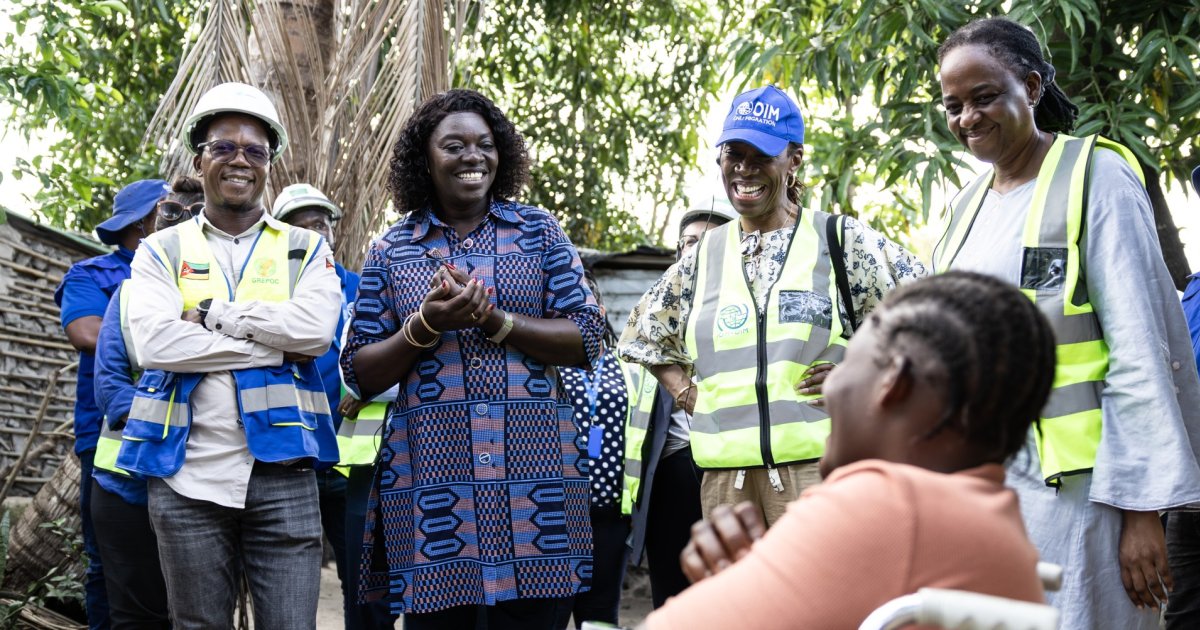
Beira/ Geneva, 25 April 2025 – International Organization for Migration (IOM) Deputy Director General for Operations Ugochi Daniels called for increased sustained development financing to help communities in Mozambique grappling with climate-induced displacement. Wrapping up a three-day visit to the Southern African country this week, DDG Daniels also reaffirmed IOM’s commitment to finding durable solutions for people in Mozambique.
“The UN Solutions Agenda calls on us to move beyond short-term fixes,” said DDG Daniels. “In Beira, I met women and local leaders who are not only rebuilding homes but reshaping futures. They reminded me that the most sustainable solutions are those driven by the communities themselves—solutions rooted in dignity, knowledge, and local leadership. Our role is to listen, support, and amplify their efforts.”
Mozambique ranks among the world’s top 20 countries most exposed to disasters worldwide, according to the Global Climate Risk Index. Between 2019 and 2024, recurring disasters displaced over 140,000 people, destroyed homes, and overwhelmed fragile infrastructure. In the past six months alone, severe drought—exacerbated by El Niño and limited food security—has displaced an additional 10,000 people.
Climate shocks are escalating in frequency and severity. In just three months cyclones Chido, Dikeledi and Jude affected more than one million people. Rising temperatures, erratic rainfall, and rising sea levels are compounding the risks faced by communities already experiencing chronic poverty and inadequate housing, deepening vulnerability, and prolonging displacement.
During the visit, DDG Daniels heard first-hand from disaster victims and community leaders during her visit. She also met with senior government officials, including the President of the National Institute for Disaster Risk Management and Reduction, Luisa Celma Caetano Meque, as well as donors, partners, and other UN officials, including the United Nations Resident Coordinator in Mozambique, Catherine Sozi.
IOM Mozambique is supporting the repair and reconstruction of over 6,000 homes through the Cyclone Idai and Kenneth Emergency Recovery and Resilience Project (CERRP) in Beira. The project exemplifies the Build Back Safer approach—combining resilient construction techniques, community leadership, and environmental safeguards. With funding from the World Bank and coordination by the Government’s Post-Cyclone Reconstruction Office (GREPOC), the initiative is implemented in partnership with UN-Habitat and Dora Construções, merging technical expertise with local knowledge to strengthen long-term resilience.
“Recovery is not something done to communities,” said IOM Mozambique Chief of Mission, Dr. Laura Tomm-Bonde. “It is something we do with them—and ultimately, something they lead.”
IOM supported recovery efforts are not limited to infrastructure. Core to the project is the training of local artisans in resilient building techniques, fostering employment while ensuring safer, climate-adapted homes.
The sites visited during the mission showcase how the UN’s Solutions Agenda—which advocates for long-term, development-oriented approaches to displacement—translates into action on the ground, focusing on durable solutions that promote self-reliance, resilience, and social inclusion. This demonstrates how global commitments take root in community-led recovery efforts like those in Beira.
For more information, please contact IOM Media Centre
Please visit:
Our Sponsor
